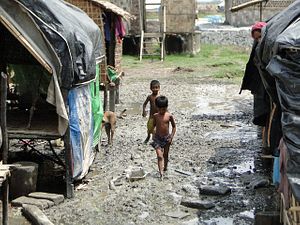Ruma Mandal recently authored an article in The Diplomat arguing that international human rights law can play a significant role in protecting the rights of stateless persons. The UN, Mandal argues, can take the lead by encouraging states to reform their nationality laws, improve birth registration, and so on. However, Mandal’s piece ignores the fact that it is not a lack of international order, but the form of the international order itself that creates the world’s refugee crises. International law and the idea of human rights have not, and cannot, solve the problem of statelessness.
Hannah Arendt articulated this problem in the wake of the First and Second World Wars. Universal human rights matter most to those who have nothing but their mere existence as human beings to protect them. For Arendt, the problem was not merely that the rightless “are deprived of life, liberty, and the pursuit of happiness, or of equality before the law and freedom of opinion – formulas which were designed to solve problems within given communities – but that they no longer belong to any community whatsoever.”
The stateless may be technically protected under international law, but they lack enforceable rights without the corresponding protection of a state. International law recognizes the right of states to determine who they recognize as citizens. This is a fundamental component of state sovereignty. States are thus permitted to deny citizenship and its corresponding rights to persons fleeing war, disaster, and tyranny who seek shelter within their borders. Lacking the normal rights of citizens, refugees are subject to the caprice of the host nation. Paradoxically, the very ideas of nationality and citizenship deprive human beings of their rights the moment they leave their own polity. The resulting “natural” response of states has been to contain the stateless within refugee camps, isolating them from the normal civic and social life of the host nation.
International agreements, like the 1954 Convention on the Status of Stateless Persons and the 1961 Convention on the Reduction of Statelessness, seem to offer some level of protection for the rightless. They are, however, essentially unenforceable. No one should believe that international law will convince the government of Myanmar, for example, to provide an acceptable level of rights to all of the Rohingya people, much less citizenship. Even if someone were to naturalize every currently stateless person, an almost impossible task, the very next large scale political crisis would create a new wave of refugees which states would seek to exclude from their political communities.
Without the existence of a right to belong to a political community, the “right to have rights,” there can be no lasting solution to the problem of statelessness. Yet Western nations continue to erect ever greater barriers to entry for asylum seekers and refugees. In 1998, the European Union adopted a policy to contain migrants and asylum seekers from the “Middle East, China and Black Africa” by offering development aid to countries in exchange for their cooperation in discouraging emigration. The EU now encourages the relocation of asylum seekers to countries outside the eurozone, where protections are lax and constitutional guarantees for the right of asylum are non-existent.
Australia, for its part, has convinced outlying Pacific islands like Nauru and Manus Island to “detain and process” refugees in exchange for development aid. The Australian legislature has also sought to make it more difficult for asylum seekers to reach the border in order to deny them the ability to make asylum claims under Australian law. Not to be outdone, the United States responded to a massive influx of Honduran migrants, may of whom were unaccompanied children, by actually lowering its refugee quotas for the region.
The fundamental solution to the problem of refugees cannot be found within the current confines of the international legal order. The basic components of statehood – including the right to grant and deny citizenship – are responsible for the existence of stateless persons. Particular refugee crises may be solved or ameliorated, but there will always be a crisis of statelessness as long as these political structures remain in place. The solution to the problem of the stateless lies outside the paradigm of the nation-state.
Only an international system, or group of polities, that guarantees full political and social rights to residents of a given community, regardless of nationality, can solve the political component of the refugee crises. The attempt to create a system of states based on unitary, isolated “nations” failed to account for the complexity and diversity of actual political life. Changing this system would entail a serious reconsideration of some of the most basic foundations of the modern state, including notions like citizenship. But the first step might not be so difficult. It simply requires the recognition that all human beings deserve to have rights.
Ben Reynolds is a writer and foreign policy analyst based in New York. His commentary has appeared in The Diplomat, Russia Today, and CounterPunch. You can follow him on Twitter at @bpreynolds01.

































